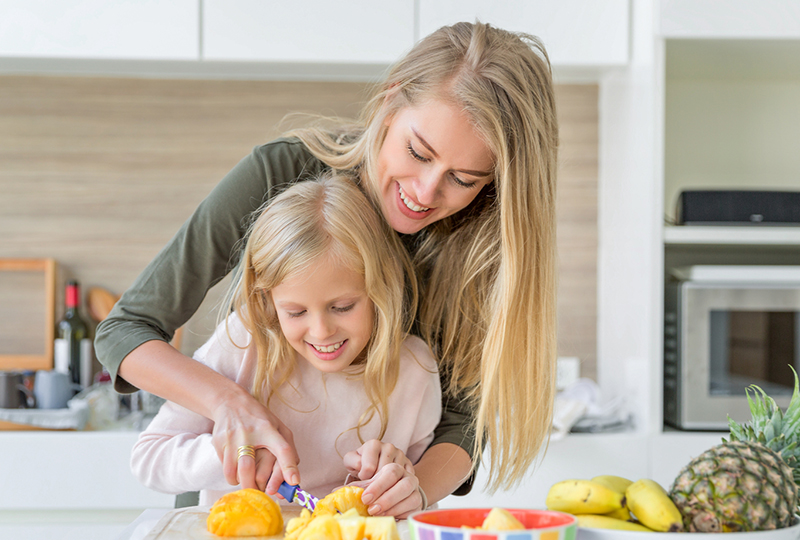Cooking with your children can lead to life-long health and social benefits.
Setting your kids up with practical tools they can use for life is part of being a good parent, right? We want them to know how to balance a checkbook, get up on time and write thank-you notes. But a lot of parents fail to include the value of cooking basic meals in that list of important skills.
I was raised in a household where home-cooked meals and dinner around the family table were the norms. So when my kids were little, I started encouraging what I hope will become a lifelong passion for cooking at home. My daughters both live on their own now, and it seems that they are well on their way. Not only do they proudly send me pictures of meals they have made, but they call me for tips (“Mom, how do you peel garlic?”) and regularly ask how I made something they remember from childhood (“Mom, remember that breaded fish we always had?”). They also cook with a healthy focus, which has always been important to me, and they enjoy preparing meals for friends. I think I did it!
Why should we care if our kids can cook? If for no other reason, we should care because it impacts their health, now and in the future. Research has shown that people who cook at home, rather than eating out or eating prepared or highly processed foods, eat more nutritiously. They tend to eat more fruits and vegetables, fewer calories and less sodium and saturated fat. Teaching kids to cook boosts their chances of maintaining a healthy weight into adulthood, and reduces their risk of developing chronic diseases such as diabetes and heart disease that are epidemic in America largely due to our lifestyles. You can make a difference in your child’s health.
The other big reason I always felt it was important to teach my kids to cook is because I cherish time around the table with friends and family, and I wanted to pass that value on to them. Sharing a meal you have cooked with people you care about is a way to show love, to make time for conversation and to create and pass on traditions. It is not unusual for my adult sisters and me to sit at the table with my mother, lingering after a meal, talking and laughing for hours. Some of the best conversations and memories of my life have happened around the table. I want that for my daughters, too.
A few simple ways to encourage a love of cooking in your kids is to:
- Play “restaurant” with a menu that the kids create, with simple options like peanut butter and jelly on whole grain bread or English muffin pizzas.
- Encourage kids to help plan easy meals and shop with you to buy the ingredients.
- Let younger kids help with age-appropriate tasks such as stirring, measuring, mashing or setting the table.
- Teach older kids basic recipes as they show interest, such as breaded chicken fingers or fish tacos. Let them prepare the meal with your assistance.
- Model the desired behaviors by preparing fresh meals at home as much as possible and save restaurants for special occasions. For families on the go, pack food to take along, to avoid the fast-food frenzy.
- Eat together. If dinner is impossible during the week, try having breakfast together during the week and dinner on the weekends.
Parents, grandparents and children cooking together in the kitchen, sharing recipes and sitting around the table is a lost art in many households. Teaching your kids to cook and appreciate the value of meals eaten together can not only encourage a healthier lifestyle, but give your child warm memories for a lifetime.
Stacey Kendrick, MS, is a health educator with more than 20 years of experience in wellness and population health. She spent much of her career at Vanderbilt’s Faculty/Staff Wellness Program and currently works in Strategic Marketing at Vanderbilt. She is mother to two adult daughters. In her free time, she teaches healthy cooking classes, runs, gardens and enjoys backyard bonfires.

